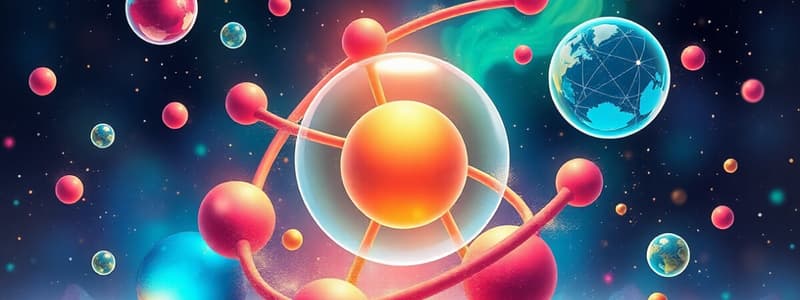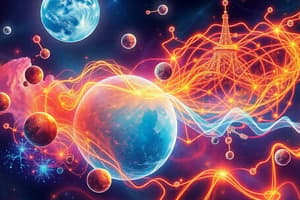Podcast
Questions and Answers
What is the smallest particle of a substance that can exist independently and has all the properties of that matter?
What is the smallest particle of a substance that can exist independently and has all the properties of that matter?
- Compound
- Molecule (correct)
- Mass
- Atom
Which of the following correctly describes the state of matter known as liquid?
Which of the following correctly describes the state of matter known as liquid?
- Molecules are tightly packed and have a definite shape.
- Molecules are fixed in place and cannot move.
- Molecules are loosely packed and can flow. (correct)
- Molecules are very loosely packed and can be compressed easily.
Which statement about the mass of a body is correct?
Which statement about the mass of a body is correct?
- Mass changes when a substance changes state.
- Mass varies depending on the location on Earth.
- Mass is the same everywhere on Earth. (correct)
- Mass is only relevant in solids.
What happens to most solids when they are heated?
What happens to most solids when they are heated?
Which of the following is NOT a characteristic of gas?
Which of the following is NOT a characteristic of gas?
Which description best represents the properties of gases?
Which description best represents the properties of gases?
How does the mass of a body change when taken to a different location on Earth?
How does the mass of a body change when taken to a different location on Earth?
What happens to liquids when they are heated?
What happens to liquids when they are heated?
What characteristic defines solids compared to liquids and gases?
What characteristic defines solids compared to liquids and gases?
Which statement is true about molecules in a solid state?
Which statement is true about molecules in a solid state?
What is the primary difference between the molecular arrangement in solids and gases?
What is the primary difference between the molecular arrangement in solids and gases?
Which statement correctly describes the behavior of liquids compared to solids?
Which statement correctly describes the behavior of liquids compared to solids?
What can be inferred about the properties of matter in general?
What can be inferred about the properties of matter in general?
Which example represents matter in gaseous form?
Which example represents matter in gaseous form?
How do molecules in gases differ from those in liquids when subjected to heat?
How do molecules in gases differ from those in liquids when subjected to heat?
Study Notes
Definition of Matter
- Matter is any substance that occupies space and has mass.
- Key properties include having mass or weight and occupying space.
Mass of Matter
- Mass is the quantity of matter in a body and remains consistent regardless of location on Earth.
Composition of Matter
- Matter is composed of tiny, invisible particles known as atoms.
- Atoms combine to form molecules, which are the smallest independent units of a substance that possess all properties of that matter.
States of Matter
Solid
- Molecules in solids are closely and tightly packed, restricting movement.
- Solids have a definite shape and volume.
- Most solids can transition to liquid form when heated (e.g., ice, iron, wax, lead).
Liquid
- Molecules in liquids are loosely packed, allowing for movement within the liquid.
- Liquids flow from higher levels to lower levels and do not have a definite shape, conforming to the shape of their container.
- They possess a definite volume and can change into gas when heated (e.g., water, oil, petrol, milk).
Gas
- Molecules in gases are very loosely packed and spaced far apart.
- Gases have neither definite shape nor volume, filling any available space.
- Gases can be compressed into smaller volumes (e.g., water vapor, air, smoke).
Definition of Matter
- Matter is any substance that occupies space and has mass.
- Key properties include having mass or weight and occupying space.
Mass of Matter
- Mass is the quantity of matter in a body and remains consistent regardless of location on Earth.
Composition of Matter
- Matter is composed of tiny, invisible particles known as atoms.
- Atoms combine to form molecules, which are the smallest independent units of a substance that possess all properties of that matter.
States of Matter
Solid
- Molecules in solids are closely and tightly packed, restricting movement.
- Solids have a definite shape and volume.
- Most solids can transition to liquid form when heated (e.g., ice, iron, wax, lead).
Liquid
- Molecules in liquids are loosely packed, allowing for movement within the liquid.
- Liquids flow from higher levels to lower levels and do not have a definite shape, conforming to the shape of their container.
- They possess a definite volume and can change into gas when heated (e.g., water, oil, petrol, milk).
Gas
- Molecules in gases are very loosely packed and spaced far apart.
- Gases have neither definite shape nor volume, filling any available space.
- Gases can be compressed into smaller volumes (e.g., water vapor, air, smoke).
Definition of Matter
- Matter is any substance that occupies space and has mass.
- Key properties include having mass or weight and occupying space.
Mass of Matter
- Mass is the quantity of matter in a body and remains consistent regardless of location on Earth.
Composition of Matter
- Matter is composed of tiny, invisible particles known as atoms.
- Atoms combine to form molecules, which are the smallest independent units of a substance that possess all properties of that matter.
States of Matter
Solid
- Molecules in solids are closely and tightly packed, restricting movement.
- Solids have a definite shape and volume.
- Most solids can transition to liquid form when heated (e.g., ice, iron, wax, lead).
Liquid
- Molecules in liquids are loosely packed, allowing for movement within the liquid.
- Liquids flow from higher levels to lower levels and do not have a definite shape, conforming to the shape of their container.
- They possess a definite volume and can change into gas when heated (e.g., water, oil, petrol, milk).
Gas
- Molecules in gases are very loosely packed and spaced far apart.
- Gases have neither definite shape nor volume, filling any available space.
- Gases can be compressed into smaller volumes (e.g., water vapor, air, smoke).
Studying That Suits You
Use AI to generate personalized quizzes and flashcards to suit your learning preferences.
Description
Explore the fundamental concepts of matter in this Grade 6 chapter. Understand the properties of matter, such as mass and volume, and learn about the particles that make up matter, including atoms and molecules. This quiz will help reinforce your knowledge of these essential scientific concepts.




